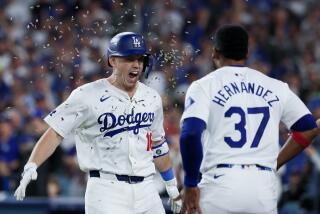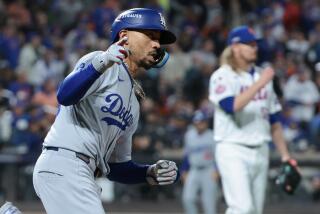Hailed and Hated : The Pugnacious Mets Grind Out Victory After Victory, Turning the Rest of NL East Into Just So Much Sausage
- Share via
PHILADELPHIA — They are the National League’s runaway leaders in the Win and Loathe columns. They are hailed and hated.
Do the New York Mets care?
“What do we care,” second baseman Wally Backman said during last week’s series here.
“A lot of it is just jealousy and envy. The bottom line is that we want to win, and if people don’t like you for winning, we can live with that because winning is our goal.”
The Mets have been doing an impressive job of achieving it in a Silver Anniversary season that has turned golden.
They have led the Eastern Division since April 23, a span of 117 days. A lead that has been as many as 19 games and no fewer than 10 since July 1 prompted a demoralized Whitey Herzog, who manages the league’s defending champions, the St. Louis Cardinals, to concede by early June--or was it early May? And in defeating the Phillies, 8-4, here last Monday, the relentless Mets soared 40 games over .500, a club record.
Going into tonight’s 5 p.m. nationally televised game with the Dodgers (Channels 7 and 10), the Mets are 77-41, 36 games over .500, after losing four of six games to St. Louis.
“It’s impossible for us to lose now,” Backman said, alluding to the division race, “but the intensity is still there. Now we’re at the point where we want to see how many games we can win and how many games we can win it by.”
That’s all part of Manager Davey Johnson’s “accelerator to the floor” philosophy, “taking nothing for granted” while maintaining the same competitive level through the dog days of a race they have already won.
“I want them to keep grinding,” Johnson said, having said it so often in his three years as the manager that he now believes the message is clear.
“Do we look like a team that needs a lot of motivation?” he asked on the night the Mets went 40 over .500, which led him to say that he wanted to be 50 over, that “when you work hard to get what you’ve got, you don’t want to give it up.”
Of that, he no longer seems worried. “You’ve got to know the type of individuals we have on this club,” he said. “We’ve got a lot of gamers, guys who don’t like to lose. Last year, we won 98 games and got nothing. We’ve got guys here who are still hungry.”
Hail the Mets for their drive, their intensity, their obvious talent--but a hatred has developed among some people and some teams in response to the Mets’ style. They are being called cocky, arrogant and demonstrative to the point that even Ron Darling, who pitches for the Mets, recently said:
“I’d hate to pitch against the Mets. Too many demonstrations. Down the road, somebody’s going to remember that we showed them up.”
Somebody, perhaps, like David Palmer of the Atlanta Braves. Palmer yielded a home run to Gary Carter July 11 at Shea Stadium and watched as Carter responded to the crowd’s cheers by emerging from the dugout to shake a raised right fist in what is his patented gesture. Palmer then hit Darryl Strawberry with his next pitch, initiating a bench-clearing brawl.
“They act as though they won the seventh game of the World Series,” Palmer said of the Mets.
“I don’t care how many home runs you hit, but don’t show me up.”
Cardinal shortstop Ozzie Smith put it another way. “We know they’re good, but they act like they have to remind everyone all the time,” Smith said.
Some of the hatred is normal. New York teams seem to generate it even when they’re losing. The Mets have won with such consistency, frustrating and demoralizing their division and league, that they have compounded that basic distaste for New York athletes.
Said Johnson, a former infielder with the Baltimore Orioles: “I came up at a time when the Yankees were no longer the power they had once been, but there was still a special feeling when we beat them.”
The perception of the Mets, however, is that they rub it in, that they flaunt their success. The curtain calls for Shea Stadium homers, even the most meaningless, are part of it. Said a writer who covers the club regularly: “The Mets lead the league in self-congratulations and a lot of it is bush.”
There are high fives, low fives and the pumping fist of Carter, who establishes much of the tone, leaving no doubt as to why he is called The Kid. He has also been called Camera Carter because he always seems to be facing one. Johnson compared Carter to Frank Robinson. “There are some players who generate both like and dislike,” the manager said. “Gary is the same as Frank. You hate him when he’s on another team and love him when he’s a teammate.”
Now on the 15-day disabled list with a partially torn ligament in his left thumb, an injury that is not expected to sideline him for more than two to three weeks, Carter leads the league in runs batted in. He soon may be called an MVP rather than Kid or Camera.
The Mets’ persona has been augmented by the development of center fielder Lenny Dykstra, who is known as Nails because he seems to be that hard; by the acknowledged temper of Ray Knight, and by a dugout ritual that opponents view with the same disdain as they view the curtain calls.
On those rare occasions when the Mets trail, infielder Howard Johnson organizes the rally caps. A group generally composed of himself, Tim Teufel, Bob Ojeda and Darling sit next to each other on the bench with caps similarly tilted, shaped or located in one of nine different positions, a practice frequently followed by college teams.
If posing stoically with a ball resting in an uptilted bill seems below the dignity of a professional team that is one of the best, the infielder known as HoJo shakes his head and says, “All I know is that it must work. We’ve led the league in hits and runs almost all year.”
The Mets now lead the league in fights, too. They’ve had four and expect more, considering the emotions that they seem to engender.
In addition to the July 11 brawl with Atlanta:
--In a game against the Dodgers May 27, Knight charged the mound when hit by a Tom Niedenfuer pitch after the preceding batter, George Foster, had rocked the right-hander with a grand slam.
--First base coach Bill Robinson triggered a June 6 melee with the Pittsburgh Pirates by demeaning pitcher Rick Rhoden for allegedly doctoring the ball.
--The benches emptied again July 22 when Knight threw a punch at Cincinnati’s Eric Davis, who had slid hard into third base, prompting a push from Knight and a retaliatory shove by Davis. Knight was fined $1,000 by the league office.
Outfielder Dave Parker of the Reds emerged from that series saying he wished his team had another series with the Mets so they could fight again.
“There are too many tough guys over there,” he said. “I think they ought to be shown there are tough guys everywhere.
“I’ve seen better teams than the Mets. I hope we meet them in the playoffs. They can be had.”
Said Davey Johnson: “We didn’t need the fights to know that other teams don’t like us. The fights brought it out in the open. The fights make it seem more emotional than it is.”
Said Backman, sitting at his locker in the visitors’ clubhouse here: “We’re not looking to get anyone hurt in a pennant race, but we’re not going to take it lying down. If other teams want to throw at us or push us around physically, we have to establish respect.
“I mean, I understand how it feels when you’re playing poorly and the other team is so much better. You can get frustrated, ticked off at times, but we’re not trying to show anyone up or bury another team verbally. And it’s not like we’re going out looking to fight. A fight starts with one or two guys on the spur of the moment.”
The Mets had four batters hit by pitches during a recent series in Montreal and two more during a three-game series here. They resisted retaliation. Their view is that they are more confident than cocky, more aggressive than arrogant.
Said Dykstra: “We’re playing aggressively and playing to win. However people take that is up to them. When you’re playing as well as we are, it (the dislike) comes with the territory. I don’t hear anyone complaining about how cocky a last-place team is.”
Said Knight: “I’ve heard all I want to hear about the nasty and arrogant Mets. We may go overboard at times, but it’s not done to pull anyone down or show anyone up. We’re just letting off steam and responding to the fans. It’s no more than Tommy Lasorda hugging the Dodgers.”
The Dodgers have also been called cocky and arrogant, but not during a season in which they are struggling. Why disturb a sleeping dog? It’s the nature of the game.
Said Carter: “There’s bound to be envy and jealousy on the part of players who would like to be in our position and to be part of what we have going.”
He added that a combination of factors have enlarged the situation, making it more than it seems, perhaps. He cited the fact that the Mets operate in a media capital, that it’s their 25th anniversary, that it has been 13 years since the fans had a winner and that here’s a team with “a lot of high-profile players” who have “a flair for winning” and unwillingness to accept defeat.
The Kid makes no apology for his own enthusiasm and fist-pumping response to home runs.
“It’s an emotional thing brought on by the fans,” he said. “For them to be applauding and cheering and for us not to respond would be demoralizing and insulting to them. It’s nothing more than a curtain call in the theater. It happens in other parks with other teams, too.”
For Davey Johnson, arrogance and cockiness are strictly a case of semantics.
“They said the same thing about the Cardinals last year and the Cubs the year before,” he said. “It’s just more pronounced because we’re from New York and have a big lead. Arrogance doesn’t win games, but I don’t care what they term it. I look on it as confidence, and that’s what I want.”
The confidence has been growing. A team that was 68-94 in 1983 went 90-72 in 1984, Johnson’s first year, and 98-64 last year, despite the absence of Darryl Strawberry, Mookie Wilson and Bruce Berenyi for prolonged periods because of injuries. Only the Cardinals, with 101 wins, and the Toronto Blue Jays, with 99, won more games in the majors in 1985.
“Frustrating?” Johnson asked rhetorically. “Not really. I thought we did all we could do under the circumstances. Someone simply had a better year.”
And this season? “Our hope was that by attacking the areas in which we still had room for improvement and combining the continued maturation of a young pitching staff with a year relatively free of injury, we could do what we had failed to do last year,” Johnson said.
Said Frank Cashen, the general manager: “We turned a corner in ’84 when we were runner-up to the Cubs, but I still thought we needed another right-handed hitter, somebody between Straw and Keith (Hernandez). Then we made the deal for Carter, and I thought we had a real chance in ’85 except that the Cards went out and won 101 games. I give them credit, but as I told people when the season was over, I wouldn’t trade teams even up.”
Neither did Cashen stand pat. He bolstered his already strong pitching rotation by acquiring the left-handed Ojeda in a trade with the Boston Red Sox and he improved the depth by trading with the Minnesota Twins for Teufel, who has platooned with Backman at second.
The continued development of Dykstra and the comparatively anonymous Backman, two farm products who have been among the league’s top 10 hitters, has provided the Mets with a pair of persistent table-setters ahead of Hernandez, Carter and Strawberry. And the arrival of another versatile farm product, Kevin Mitchell, has additionally strengthened the bench. Mitchell has been seen at seven different positions, including team barber. He is one of 13 Mets who have delivered game-winning hits.
Said Backman, of a team that leads the league in runs, hits, home runs and team batting average: “The fact that anyone in the lineup can do it for us is really exciting. It’s never the same guy. The fact that we don’t have to worry about Keith, Gary and Darryl winning every game has taken a lot of the pressure off them and everyone else.”
The Mets have reeled off winning streaks of 11, 8, 7 twice, 6 and 5 games while threatening to become the first team since the 1958 Yankees to lead the major leagues in home runs, team batting and team earned-run average. Said Strawberry, when asked if he was surprised that the Mets were 40 over .500:
“No. We expect to be 50 over. We expect to do a lot better. We have great talent. We have a great combination of young players and veteran players.”
This has also been a summer comparatively free of injuries, Johnson getting his wish--but there have been distractions.
Among them: Commissioner Peter Ueberroth’s March announcement that Hernandez was being penalized for drug involvement; a spring injury that forced Wilson to open the season on the disabled list; the July incident in a Houston bar that has left Darling and Teufel facing indictment for aggravated assault, a felony, and Ojeda and pitcher Rick Aguilera charged with hindering an arresting officer, a misdemeanor; the GQ article in which Darling said he had virtually no communication with Johnson and compared their relationship to that of Jim Palmer and Earl Weaver; a series of problems with George Foster that culminated in his release after he seemed to accuse the Mets of racist practices, an interpretation that he later denied, and the “What’s Up Doc?” headlines and media furor over Dwight Gooden’s midseason struggle.
Gooden is 12-4 in the wake of 1985’s 22-4. He has lacked his previous consistency and strikeout punch, but a 3.02 earned-run average, while not the 1.53 of last year, seems to support Johnson’s contention that his only real problem has been a tendency to overthrow, to try and do too much in the wake of his ’85 success. Said Carter: “People forget that Doc is only 21. He’s still maturing, still learning. Last year was a dream season. It’s unfair for people to expect him to duplicate it every year.”
As it is, Carter said, pitching remains the foundation of a team that has (a) five starters “who are each capable of being a No. 1” and (b) a left-and-right relief complement (Jesse Orosco and Roger McDowell) that may be baseball’s best.
The Mets are a modest 18-16 since the All-Star break, and only time will determine if their momentum is waning. Maybe it would be appropriate now for Johnson to ease back on the accelerator and conserve some resources in preparation for the playoffs.
Said Knight: “You can’t turn it on and off. We still have an almost obsessive desire to win. People have wondered how we would react with the big lead, if we’d become complacent or not. The fact that we’ve continued to play well shows our character and competitiveness.”
Said Backman: “We’ve already won the division, but we all know that we have to win eight more games when the season ends or it won’t be a success. The goal now is to be as prepared as we can for that part of it.”
The Mets have dominated the regular season much as the 1984 Detroit Tigers did, wiping out their division even before summer arrived. The true test will come in October. The Mets have a chance to be remembered for more than their alleged arrogance and cockiness.
Said Knight, when asked if he expects to be re-signed: “Will I be here next year? I don’t know. I’m here this year, and that’s what everyone will remember. Everyone will remember that I was the third baseman and a significant contributor on one of the best teams ever.”
Carter views it similarly, calling this a dream season, the thrill of a lifetime. He said he has tried to savor every moment of a summer unlike any of the 10 he spent in Montreal. He said that a season that began with the Mets seeking to prove that the 98 wins of last year weren’t a fluke has now evolved into a different pursuit, a different matter of pride.
“I think we’re all looking for the personal gratification of being able to walk down the street and say we played on the greatest Met team ever,” The Kid said. “I don’t think that will be taken out of context. The ’69 team won 100 games, but I feel confident we’ll exceed it.”
Exceeding and/or excess. Some would say that both are specialties of the ’86 Mets.
More to Read
Go beyond the scoreboard
Get the latest on L.A.'s teams in the daily Sports Report newsletter.
You may occasionally receive promotional content from the Los Angeles Times.










